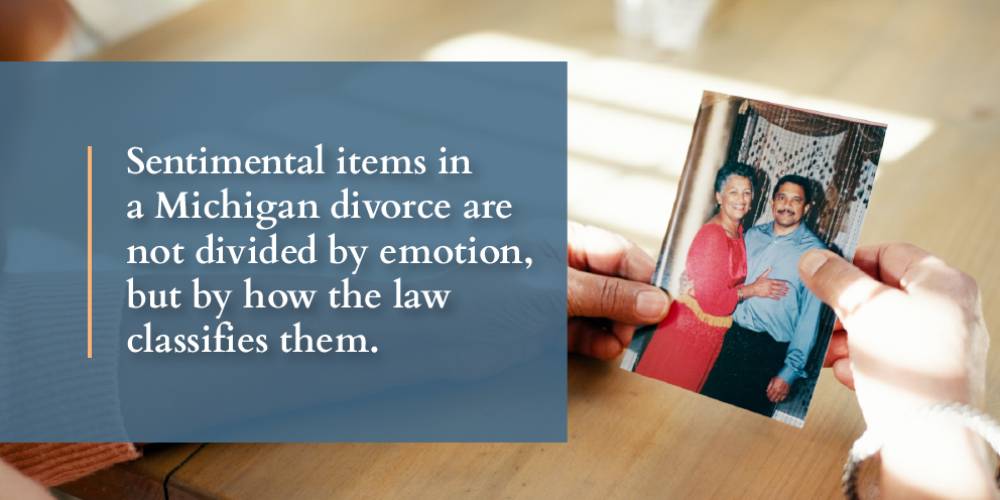Who Gets Wedding Rings and Family Heirlooms in a Divorce?
 Divorce feels different when your main disagreements are not about cash flow or retirement accounts. For many, the most difficult fights to solve in a divorce involve items with personal history: a wedding ring worn for generations, artwork passed down through the decades, or a vacation property that has been in one family since childhood.
Divorce feels different when your main disagreements are not about cash flow or retirement accounts. For many, the most difficult fights to solve in a divorce involve items with personal history: a wedding ring worn for generations, artwork passed down through the decades, or a vacation property that has been in one family since childhood.
These items are not just random things. They are meaningful sources of memories, identity, and sometimes a connection with someone you’ve lost. So what happens to heirlooms and sentimental belongings in a divorce?
Understanding how courts classify and divide these assets can help you have realistic expectations and make smarter decisions. Our Michigan divorce attorneys can help.
How Does Michigan Law Classify Sentimental and High-Value Personal Property in a Divorce?
Michigan is an equitable distribution state. That means property is not automatically divided 50/50. Instead, courts divide marital property in a way they consider fair under the circumstances, per MCL 552.401.
Classifying Marital Property
The first step is classification. Every item must be categorized as either marital property or separate property. Under Michigan law, marital property includes assets acquired during the marriage, no matter whose name is on the title. Separate property typically includes assets owned before the marriage or acquired by gift or inheritance by one spouse alone.
What Do Michigan Courts Consider When Dividing Property?
The first thing to know is that over 670,000 divorces are filed every year in the U.S. according to the CDC; the vast majority of divorces in 2026 will settle out of court. You and your spouse should try to figure things out between yourselves, using your attorneys or mediators as necessary. Even if you would rather go to court to figure out your property division, a judge will probably order you to mediation first.
In the cases where courts do decide how to divide marital property, they consider:
-
Fairness
-
Each spouse’s contribution
-
Each spouse’s needs
This is especially important when dealing with items that are both valuable and irreplaceable.
Who Keeps Engagement Rings and Wedding Rings Under Michigan Law?
Engagement rings and wedding rings are treated differently than other marital property.
If an engagement ends before marriage, Michigan courts generally treat the engagement ring as a conditional gift. The condition is marriage. If the marriage does not happen, the ring usually goes back to the person who bought it, regardless of who ended the engagement.
Once the marriage takes place, that legal analysis changes. At that point, an engagement ring is considered a completed gift. The same is true of wedding rings and anniversary rings. These items usually belong to the spouse who received and wears them.
This is true even when the ring is extremely valuable. Courts generally will not require it to be sold or offset unless there are unusual circumstances, such as extreme imbalance in asset division or dissipation of marital property.
Are Gifts From In-Laws or Family Members Considered Marital Property in a Divorce?
Gifts from family members can cause confusion, especially when they are expensive.
Under Michigan law, a gift for one spouse is usually considered that spouse’s separate property. This is true even if the gift came from the other spouse’s parents. For example, a piece of jewelry from the husband’s mother to his wife as a birthday or "push present" is almost certainly the wife’s alone.
But what about when the gift giver’s intent is unclear or when the gift is used by both spouses? Take a set of heirloom silverware, for example, given to a wife on her birthday from the husband’s parents. A court would look at how it was used, stored, and insured during the marriage. Was it only ever used at family events? Did both spouses contribute to keeping it in good shape and insured? This will help determine whether it is separate or marital property.
What Happens to Family Heirlooms and Inherited Assets in a Michigan Divorce?
Inheritances are treated as gifts under Michigan law. If an inheritance is clearly intended for one spouse and kept separate, it is usually classified as separate property. This includes small things like jewelry and watches, but it can also include real estate and investment accounts.
But Michigan courts also recognize that marriage is a financial partnership. If the spouse who didn’t inherit these things helps pay for their upkeep or improvement, the court may decide that spouse is a partial owner.
When Does One Spouse’s Inheritance Become Marital Property?
"Commingling" is where many high-asset divorce cases become complicated.
An inheritance can lose its separate character if it is mixed with marital assets in a way that makes it indistinguishable. This is called "commingling" assets. Common examples include:
-
Using inherited money to renovate a jointly titled home
-
Depositing inherited money into a joint investment account
-
Titling inherited real estate in both spouses’ names
Michigan courts may also apply what is known as the "invasion doctrine." Even if an asset remains technically separate, the court can award a portion of it to the other spouse.

What Practical Steps Should You Take to Protect Heirlooms During Divorce?
If you are worried you are about to lose your grandmother’s wedding ring or a piece of treasured family art, there are some things you can do now.
Here are some focused actions that can make a real difference:
-
Gather as much information as you can about the origin of inherited or gifted items – include photographs, appraisals, and written records.
-
Avoid moving, selling, or gifting property without legal advice. This could look like you’re trying to hide it.
-
Put high-value items in a safe, known place to prevent loss, damage, or accusations of concealment.
-
Pay for independent appraisals for artwork, jewelry, or collectibles.
-
Be realistic about which items really matter and which can be used as leverage in negotiation.
Call a Farmington Hills, MI Divorce Lawyer Today
If your divorce involves valuable, sentimental objects, you should meet with one of our Oakland County, MI divorce lawyers. We regularly handle complex asset division and have more than 20 years of experience with family law issues.Call Elkouri Heath, PLC at 248-344-9700 to learn more about how we can help.











